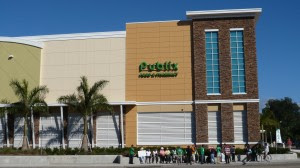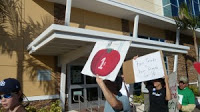On the afternoon of Sunday, November 13, 2011, walking along the west side of South Tamiami Trail I noticed a large group of people gathered around the newly built Publix supermarket. I was aware that it was their grand opening day, and mildly resented it. After staring for a bit longer, I had also noticed something peculiarly artistic and un-Publix like. I crossed the street to inquire.
After talking with a few folks who mentioned farmworker exploitation, I began to understand the premise. It was now apparent that this wasn’t sponsored by Publix.
It was now time to speak with the head honcho. I put in the request and was soon approached by a fellow wearing a shirt reading Coalition of Immokalee Workers (1). From what I was able to interpret, CIW has approximately five-thousand members, and represents approximately thirty-thousand workers. This was definitely not part of the Publix grand opening; it was a protest, and attendance was growing quickly.
 |
| Ad |
It was explained to me that a farmworker harvests roughly 2.2 tons of tomatoes over a 10-12 hour day in exchange for a rate of $0.50 per 32lbs harvested (approximately $68.75 daily).
One of the goals of the event was a one-cent/per-pound increase in the price of tomatoes. The current rate is about $0.0156 per pound harvested, and would be raised to $0.0256. This would result in $0.81 per 32lbs, raising daily wages from $68.75 to $111.00, a significant difference.
At 10-hour days, this would equal about $11.00 per hour. At 12-hour days it would be less, but much more than the unacceptable rate of $6.80 per hour.
I know from my own experience that farm work is tough. Days are often long under the sun, and the constant bending is rarely much fun. Not only is the labor of farm work essential for the vast majority of humanity’s survival, it is one of the noblest forms of work, as well as one of the more difficult.
Exploitation is very often an issue with farm workers. The math above is objective, and I’m leaving it at that. What I oppose is exploitation of any kind, and fully support those who seek refuge from it.
Also explained to me was the refusal of Publix to disclose information on its tomato purchases in Florida. CIW has successfully established agreements with large corporations such as Taco Bell and Whole Foods, which have made their Florida purchases transparent. Why does Publix still refuse despite persistent requests?
Perhaps transparency would not benefit them any more in regard to tomatoes than it would their efforts in sophisticated behavioral-research surveillance. Publix is probably not the most successful supermarket in Florida because they love nurturing people. Quite possibly, the pennies that cannot be spared to raise wages for farm workers, are spent on Consumer Behavior Research companies, like Envirosell(2), Brickstream, Point Grey Research, ShopperTrak, and Klever Marketing to name a few. (3)
While you might have thought those camera-domes were for public safety and theft prevention, there is a bit more to it than that. That something is Market Research – the intrusive variety. Knowing what people think, how they react, and what they want, is a serious advantage. From focusing in on those who linger too long before an item, to analyzing faces as they read product labels, your every action is monitored, recorded, saved into a database for further viewing, and eventually implemented into both product and policy. Mix shopper-loyalty cards into it all, and quite a dossier is formed. And where does that dossier go? And to whom?(pdf)
But apparently all this sophisticated market-research surveillance is failing to reveal people’s sentiments on slavery. Everyone likes a good buy, but most people appreciate fairness just as much. Of course, what is out of sight is often out of mind, and maybe that’s another problem. Where are the advertisements that attempt to raise awareness rather than consumption? I guess that’s what protests are for.
Certainly we’ve all seen food prices climbing. It would be interesting to see what the profit margins are in proportion to these increases. Do they increase by percentage, or are they fixed to previous amounts? Do supermarkets implement ethical considerations into price hikes, or do they see more room for profit?
Having stumbled upon the protest impromptu, at one point I began wondering what I was supporting, and whether I had enough information to justify my presence. I reminded myself that I was against exploitation, and that this should be sufficient. When I saw the founder of a local and highly successful organic farm amongst the crowd (over 200), I instantly felt at home. There with nothing to gain, and five fertile and thriving acres waiting at home, he remained for nearly the entire event.
Aside from curiosity and conviction, I admit that my presence was partially motivated by a dislike for supermarkets in general. I know they have a purpose, but often find them grotesque in some ways. Food is an essential thing, and shopping for it should be simple. I resent being handled like a product when I shop, and have never voluntarily submitted myself to invasive research operations. Because I sometimes have no choice but to shop in places like Publix, I do not consider my use of their facilities an agreement to be studied. I also find that particular Publix less than appealing.
Just two days prior I had visited the new Publix where the protest took place. Both I, and the fellow accompanying me, were carrying bags, and looked slightly less than aristocratic. As we stepped off from the escalator on the second floor, we were greeted by a manager who asked if we needed help.
Observing certain mannerisms, and ourselves exhibiting no overt symptoms of confusion, we both interpreted this as profiling, and didn’t much like it. After jesting with the manager about behavioral research and listening to him deny it altogether, we wandered off shortly after a squad of green men (Publix employees) swarmed to the scene. I had planned on purchasing a thing or two, but was overwhelmed by a strong clinical impression of the place and simply wanted to leave.
One thing that stands out in such an environment is the pervasive advertising. I wonder if they could not sacrifice some of this cognitive artillery for a more practical shopper-sphere. It’s fine to be informed that something is available in the event that we are interested, but we really don’t need persuasion. And if nothing else, such aggressive efforts and expenditures in marketing that which we are biologically prohibited from refusing, illustrates distinctly awkward priorities – especially when those toiling in the fields that fill the shelves are treated unfairly.
Finally, regarding nueromarketing, exploitation, and general ugliness, Publix is certainly not exclusive. Target Inc, Walmart, CVS Drugs, and many other companies share similar ethics; though Publix is somewhat exclusive in their refusal to cooperate with CIW, and was indeed the focus of the protest.
1. Immokalee, Florida – The nation’s tomato basket
3. www.spychips.com/documents/Albrecht-Denver-Law.pdf – Excellent intro to the subject of retail surveillance
4. www.youtube.com/watch?v=7ZCSVySI3Sg&feature=related Neuromarketing
5. Publix Store No. 1372.
The Eccentric Intelligence Agency: Helping the Ouroboros finish itself.
linkwithin_text=’Related Articles:’








Be the first to comment on "Publix Protest, Tomatoes, and Neuromarketing"